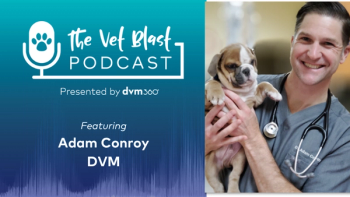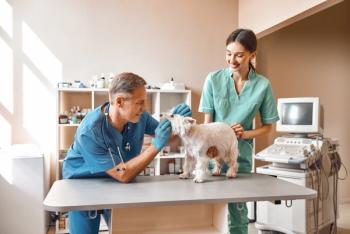
Doctors fire back on emergencies
Local veterinary hospitals refused to treat a dying dog-and not because they didn't have the skills or the client wouldn't pay.
Local veterinary hospitals refused to treat a dying dog—and not because they didn't have the skills or the client wouldn't pay. Cotton, who was seizing, was turned away from her regular veterinarian because he couldn't see her right away. So her owners took her to a second clinic that also turned them away. And the staff at the third hospital told Cotton's family to take her to the emergency clinic, which at that time of day was closed. Cotton arrived at Dr. Woloshyn's hospital nearly lifeless, where she later died.
A Bichon Frise, the same breed as Cotton.
Learn from clients
I've read years' worth of journals, and many articles have caused me to think or laugh, but few have produced an outburst of tears so strong that my dog Kody came over to comfort me. I was horrified that nobody would see Cotton. I've spent too many evenings and weekends seeing those patients and will stop practicing the day I turn a non-client emergency away. I'm going to show this article to all the staff members at my hospital and to others in our field to remind everyone of the importance of why we're here. Hopefully there are few Cottons out there.
Dr. Marisa Gerth with her dogs Kyra and Cody.
—Marisa Gerth, DVM
Alexandria, Va.
Dr. Woloshyn's response
Here's another way to remind ourselves of why we're here: Think like a client and see our world through their eyes. As a profession, we exist to serve our patients and clients, so it's imperative that we're truly empathetic toward them. The bond we share with clients is, of course, our compassion for pets.
Dr. Craig Woloshyn tried to save Cotton's life after three veterinary clinics turned her away. A Veterinary Economics Editorial Advisory Board member, Dr. Woloshyn owns Animal Medical Clinic in Spring Hill, Fla. He also owns Sun Dog Veterinary Consulting.
Over the years, my pets have been under the care of other doctors, usually specialists of some sort. This has given me a broad lesson in compassion. Though in this situation we're both doctors—and often friends—the referral doctor doesn't experience the emotional component of my pet's illness that I do. (That's one reason to refer.) And though I certainly don't wish illness on my pets, I try to learn from their afflictions and various treatments, no matter how minor. Over the years other doctors have illuminated me on pain management, quality-of-life decisions, drug compliance, and a host of other subjects that I then incorporate into my own practice.
We can also learn about compassion from our team members' pets. My employees receive pet care as an employment benefit. In return, I learn from their bond with their pets through all phases of life and health. And practices showing clinic-wide compassion generally have happier employees, better staff longevity, and much higher professional satisfaction.
Quick to blame
Even in the subtitle of the Hot Button column ("Local veterinary hospitals wouldn't treat a dying dog"), it's apparent that Dr. Woloshyn needs to assign blame for Cotton's unfortunate death. He admits that his first reaction was to place blame on the dog's owners. After obtaining more history, he turned his critical eye toward the three clinics that refused to see Cotton. Dr. Woloshyn pronounces judgment on these hospitals, ultimately accusing them of violating the veterinary oath and abandoning a patient in need.
Dr. Gene Maxwell
He does this without any knowledge of the caseload, staffing situations, or other circumstances the other clinics were experiencing that day. A need to assign blame often indicates an inability to accept human limitations—both in others and in ourselves.
Because he offers no solutions in his column but only condemnation for his colleagues, I can't discern Dr. Woloshyn's motivation for writing. Was he trying to initiate a dialogue that would move our profession toward a centralized system of care delivery patterned after that of our human-health counterparts? (Food for thought: I wonder if our human-health counterparts ever have a patient fall through the cracks like Cotton did?) Or was Dr. Woloshyn simply criticizing his colleagues for failing to be all things to all people at all times?
The latter attitude, when coupled with the public's misinformation and unrealistic expectations, ultimately leads to burnout, compromised care, and lower wages for us all. Before a veterinarian gets to eat lunch, sleep, go on vacation, or earn a higher income, he must believe and accept that these are legitimate needs. Maybe Dr. Woloshyn was overcome with grief at the loss. Maybe he just needed to fill space in his column. All I know is that I'm glad I don't practice in his community.
—Gene Maxwell, DVM
McMinnville, Tenn.
Dr. Woloshyn's response
Certainly one of my purposes in writing this article was to begin a vigorous discussion, and I suppose I've succeeded in that. But more important is this: I can't imagine any reason that a seizing patient should be turned away from a waiting room. However, I've found that refusing care for urgent and emergency patients is an all-too-common occurrence.
In writing "An Epitaph for Cotton," I simply wanted to point out that the way many of us run our clinics allows deserving and needy clients to fall through the cracks. Not non-paying clients, not uncaring clients, but long-term clients with legitimate needs that need to be addressed, sometimes immediately. I make no comments about centralized care, and the fact that the human healthcare system isn't perfect has no bearing on us.
It's possible to run a busy, profitable clinic that provides a satisfying professional life, ample time for a personal life, and an adequate income—and still see emergencies. Many of us do it every day. Yet some clinics routinely turn away patients needing urgent or emergency care that could be administered with minimal disruption. The mundane activities of hiring, training, delegating, and so on can result in such a clinic. When you hire the right people and train your team to triage emergencies, they can perform an initial assessment and monitor the pet without the assistance of doctors.
Though I disagree with much of what Dr. Maxwell has said—except perhaps the part about my flagrant neuroses—I'm glad he presented another argument for us to consider. As for my local colleagues, though none are perfect (despite their assurances to the contrary), I admire and enjoy a collegial relationship with almost all of them. We meet every Tuesday for lunch and often discuss subjects such as this.
Finding middle ground
I spent several days trying to figure out why I was so disturbed by the article about Cotton. Was it guilt? Anger? Have I done the same thing? On one hand, we're admonished to care for our team and to have a healthy life balance. On the other, we're reprimanded for failing to care for all the patients that come to us.
Dr. Ed McKnight resting with his horse Beau after a ride in Pine Mountain, Ga.
I've gone both ways. I've taken everything that walks through the door, and I've also worked hard to stay on a schedule. The result of one philosophy: fatigue, a team that's overworked, and equipment and facility pushed to the edge. The other produces a doable schedule, better patient care, and a happy hospital. You can guess which results go with which approach.
There are exceptions to every rule. I can't be everything to everyone. Each veterinarian must decide where he or she stands. I've made my peace with which philosophy I prefer—or have I? Maybe this is why the column disturbed me. Dr. Woloshyn, if you feel disillusioned and responsible for those with different views, you must come to terms with that. Maybe counseling would help. I think I'll go with you.
—Ed McKnight, DVM
Jacksonville, Fla.
Dr. Woloshyn's response
I agree that practice efficiency affects our ability to deal with schedule disruptions. I'm a longtime proponent of a happy workplace with well-tended schedules that allow us to go away for lunch and go home on time. I assure you that this philosophy is entirely compatible with the ability to accommodate the unexpected. The key to our ability to cope with crises and adapt to the unforeseen lies in successful delegation, correct triage practices, and the hiring of licensed technicians who can operate independently to make patient care decisions. In-service training should regularly cover what to do in emergency situations. A well-run clinic with a competent and compassionate staff will result in an ability to adapt to and accommodate the exigencies of practice without a glitch. You don't have to work late to work well, but you do have to plan and train for the unexpected.
It's the reality
A Epitaph for Cotton" brought tears to my eyes. I work days at a 24-hour hospital and see this all too often. At least once or twice a week, a walk-in client will say something like, "Max is having trouble breathing today. I called my regular practice, but they can't see her until Thursday. I didn't want to wait so I brought her here." This happens so frequently that I sometimes wonder if the receptionists at Elsewhere Animal Clinic tell clients they can't be seen right away because they don't want to be bothered.
Dr. Laura McLain Madsen with her dog, Leyla, a shepherd mix.
I urge my colleagues to review their policies for urgent calls. Do your receptionists know what questions to ask to determine if the pet needs to be seen immediately? Do you have appointment slots blocked off for urgent cases? If the case needs to be referred, are your receptionists trained to say something like, "It sounds like Sadie might need a C-section. Our doctor is in another surgery right now, so please take her to the referral center. The number is 555-5555. I'll fax Sadie's records right over to them."
—Laura McLain Madsen, DVM
Salt Lake City, Utah
Dr. Woloshyn's response
I too wonder how many doctors don't know that their front desk employees are turning clients away. It would astound me if doctors were doing this, so I suspect a lot of it is a result of poor front office monitoring.
When I consult with clinics, one of my first questions to the front office team is: "How many emergency patients do you turn away?" Though I don't know if I ever get an accurate answer, it's an issue we address early on.
This is a conversation all doctors need to have with their front office employees. Then you need to train them how to respond to emergencies and perform triage. You must also implement mechanisms for emergencies that don't disrupt or delay your closing time. When you perform only necessary urgent tests and procedures and delegate to your team members, you'll be surprised by how much you can accomplish in a few minutes.
Much denial of care occurs because providing the appropriate care would negatively affect the employees' day. We need to manage our clinics so that additional work results in additional satisfaction, not more stress. Admitting a laceration shouldn't mean an hour delay in going home. If it does, I'd wager that you miraculously won't ever see one after 2 p.m. To change your team's mindset and stay on schedule, train your team in emergency procedures, and make sure everyone's cross-trained so you can handle your regular appointments.
Are the days of compassion gone?
I was very much impressed with Dr. Woloshyn's article in Veterinary Economics. I've helped many poor people and their pets over the years and, yes, I didn't get paid to help some of them. I'm a third-generation veterinarian, and I'm proud to say that my family has always practiced good medicine with compassion. I hate to see all the progress the profession has made in my lifetime only to miss one major part—compassion!
—Jerald T. Waite, DVM
Fenton, Iowa
Dr. Woloshyn's response
Dr. Waite is of the generation that ushered modern medicine into veterinary practice, bringing it out of the guess-and-by-gosh days into the era of science. The newer generations have reaped the benefits of his efforts, yet they're faced with challenges that he and I will thankfully never see.
Get in touch: Want to weigh in?
Clinics are an expensive proposition nowadays. The seduction to spend money begins in veterinary school, where advanced diagnostics are employed (as they should be), yet the balance of basic medicine is often ignored (which is a tragedy). Because practice economics isn't taught to young doctors, once they graduate they're barraged by a torrent of expensive purchase possibilities and inaccurate financial information from equipment manufacturers that precludes their planning for a profitable practice.
The result is that these new doctors often focus more on paying the bills than on medicine, without realizing that compassion and income are two sides of the same coin. Those of us who spent less on starting our clinics than a current owner may spend on one lab machine are often astounded and puzzled by the new generation's seeming inability to practice successfully, have a personal life, and make a decent living. Yet it's a real challenge for them.
Perhaps some of the blame lies with owners of my generation who take no interest in developing new graduates. We may say, "Medicine happens between your ears," but if we don't show young doctors how to translate that knowledge into happy clients and cured pets, we haven't done our duty.
The new graduates I meet share your compassion. But after a few years of late hours, no support from the practice owners, pressures at home, and a low income, they're having a difficult time living out that compassion. I challenge those who know how to do this to show the new generation the way.
No doctor need choose between compassion, a personal life, and profit. These components form the backbone of successful practice. We should supply them to our clients, our staff, and ourselves. Now's the time to return to our clinics and start to live them out so that next time, Cotton gets the care she needs.
Newsletter
From exam room tips to practice management insights, get trusted veterinary news delivered straight to your inbox—subscribe to dvm360.




